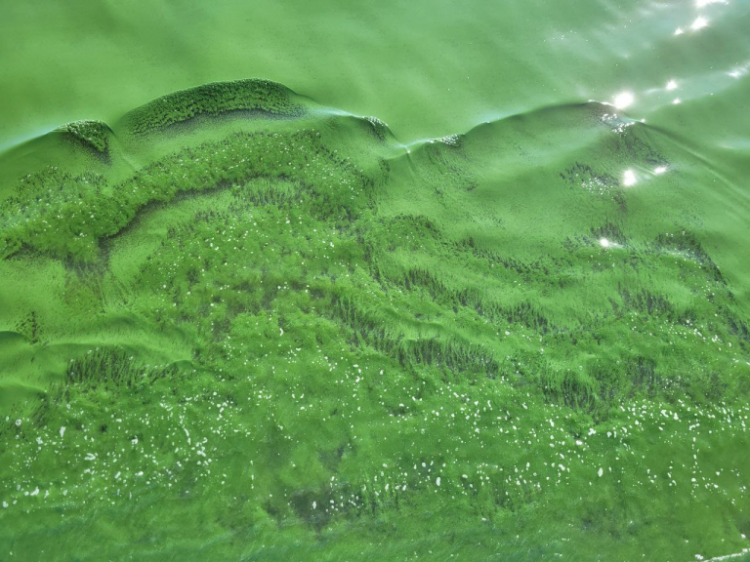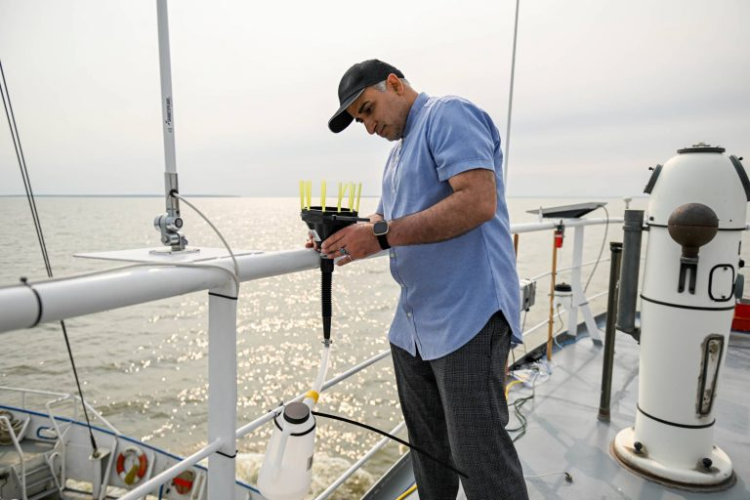A new research project is set to provide solutions to improve Lake Winnipeg's water quality. Led by UM's Dr. David Lobb, Professor in the Department of Soil Science, this project will investigate a critical missing piece in the decades-long effort to reduce harmful nutrient pollution by fingerprinting the sources of airborne phosphorus that affect water quality in the lake.
Funded by a grant from the Canada Water Agency, this work will help inform long-term plans for water management to improve the future health of Lake Winnipeg.
Lake Winnipeg's deteriorating quality impacts many groups, including fishers, cottagers, rural municipalities and Indigenous communities. By developing effective solutions to mitigate excess phosphorus, the team hopes to improve water quality, aquatic life and provide certainty for local communities about the future of the lake.
"Lake Winnipeg and surrounding waterways are vital to the social, cultural and economic well-being of Manitoba. They are essential for generating hydroelectric power, supporting tourism and recreation, and sustain important industries," says Lobb. "Our findings could shape effective land management strategies, identify actionable climate change mitigation efforts and ultimately improve the water quality in Lake Winnipeg."

Algae blooms in Lake Winnipeg, September 2024
The problem with phosphorus
Phosphorus is a major contributor to the growth of algae in freshwater, affecting fish, wildlife and local communities who depend on the lake. Because Lake Winnipeg is shallow, it struggles to effectively process high phosphorus levels.
Sources of dust containing phosphorus include boreal forest pollen, wildfire smoke and wind eroded agricultural fields. Understanding how these sources interact with land and water surfaces, and how they contribute to the lake's phosphorus loads is crucial to mitigating resulting damage. With climate change impacting the frequency and severity of wildfires, this work is particularly timely.
The research team includes Masoud Goharrokhi (Faculty of Agricultural and Food Sciences), Shawn Clark (Price Faculty of Engineering), Tim Papakyriakou and Greg McCullough (Clayton H. Riddell Faculty of Environment, Earth, and Resources), along with researchers from Brandon and the University of Northern British Columbia. This project is supported by the Lake Winnipeg Research Consortium, Inc., which plays a critical role in facilitating research on the lake.
A scientific leap: phosphorus fingerprinting
Using an innovative phosphorus fingerprinting approach, the team will collect robust data from a large area of the lake. The team will collect samples from five areas on Lake Winnipeg and other locations across the watershed, including agricultural research field stations and communities as far away as Swan Lake First Nation.

Dr. Masoud Goharrokhi on the research ship M/V Namao
"The samples we're collecting will help discriminate the relative contribution of phosphorus from sources like smoke, pollen, insects and mineral sediment from eroded soils around the lake," says Masoud Goharrokhi. "They will determine if certain sources affect the water in the centre of the lake differently than the shores, for example."
This new data will provide insight into opportunities for sustainable changes to land and water management.
"Work such as this is vital to the ongoing efforts of numerous organizations dedicated to understanding and addressing the challenges posed by excess nutrients entering the lake," says Julia Patrick, Associate Executive Director at the Lake Winnipeg Research Consortium Inc. "We support this collective effort by providing safe access to this often-unpredictable great lake aboard the research ship M/V Namao."
Lobb's research aligns with UM's commitment to research in water and food security outlined in Change through Research: UM Strategic Plan 2024-29, and in the United Nations' Sustainable Development Goals. By advancing our understanding of phosphorus pollution, this study could help secure a cleaner, healthier future for Lake Winnipeg and its surrounding communities.
This project was undertaken with the financial support of the Canada Water Agency. Ce projet a été réalisé avec l'appui financier de l'Agence de l'eau du Canada.
Research at the University of Manitoba is partially supported by funding from the Government of Canada Research Support Fund.











